Negri Bossi will be present at MECSPE that will take place in Parma from 29 to 31 October; the attendance at this event is a testament that the society continues to take an interest in the domestic market.
Negri Bossi will be present at MECSPE that will take place in Parma from 29 to 31 October; the attendance at this event is a testament that the society continues to take an interest in the domestic market.
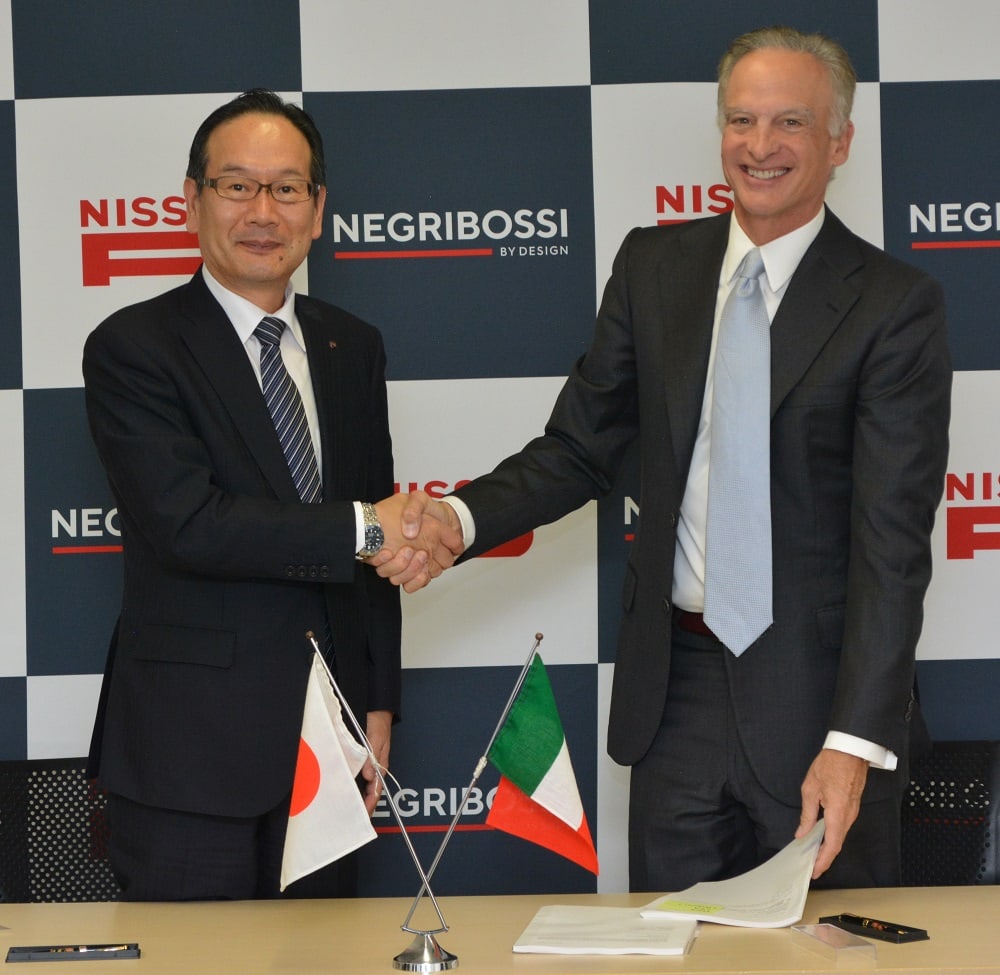
Established in 1947 in Cologno Monzese (Milan), Negri Bossi has become the number one injection moulding machine manufacturer in Italy, with a wide range of high-performance injection moulding machines, amongst which ultra-large injection moulding machines and moulding systems. The Group also provides products and solutions tailored to each customer. Negri Bossi has a particularly strong presence in Europe and a solid customer base in a wide range of industries. The Group has an important presence also in the USA, Mexico and India. Negri Bossi has achieved revenues of more than €100 million over the last few years.
Nissei Plastic Industrial is a Japanese company, listed on the Tokyo Stock Exchange, engaged in the manufacture and sale of injection moulding machines, peripherical equipment, parts and dies. The Company operates in three segments: Japan (active in purchase, manufacturing and sale of injection moulding machines and peripherical equipment), USA (engaged in the sale of products) and Asia (with China and Thailand affiliates focused on manufacturing and sales).
By acquiring a stake in Negri Bossi, Nissei will be able to expand and strengthen its business domain in the injection moulding machine field. The combination of Nissei’s injection moulding machines and Negri Bossi’s injection moulding technology is expected to expand each product portfolio and provide a comprehensive solution to a wide customer segment. Nissei will also utilize the R&D and sales capabilities of Negri Bossi to expand Nissei’s strengths in small and medium electric injection moulding machines.
“Negri Bossi is a well-established injection moulding machine manufacturer in Italy with more than 70 years of history, and this acquisition will enable respective business enhancement based on a reciprocally complementing relationship by geographical and product type perspective. Consolidated sales of the Nissei group will hit approximately 50 billion Japanese yen (€420 million). In addition to the integration of production, sales and service, we will be able to achieve further growth through global marketing with robot companies” Mr Yoda, President and Representative Director of Nissei said.
From Negri Bossi side Mr. Craig Ward, General Manager, gave his comment: “This new partnership will elevate us to the status as one of the top ten suppliers worldwide for the supply of plastic injection moulding machines. The strategic choice to purchase Negri Bossi was based on very strong potential synergies such as our strong geographical footprint in Europe and East coast of America compared to theirs of the Far east, Asia and west coast of America. In terms of product they have a history of direct lock machines whilst we have always been known for our toggle machines. We are able to offer high tonnage machines were as they currently only go to 1300ton whilst they are able to offer to market vertical machines. We are, and will continue to, be Negri Bossi with our machines and our people as that is what our customers want. The only difference now is that we have a strong industrial partner behind us who understands our market and whom can support us in order to better service our customer’s needs”
Negri Bossi has been assisted by financial advisor K Finance – partner of Clairfield International – with Managing Partner Giuseppe R. Grasso, Director Maximiliano Turelli and Analyst Claudia Brisciana. Law firm Nctm assisted on the legal aspects with Partner Pietro Zanoni, Managing Associate Alessia Trevisan and Mr Mario Bonferroni.
Nissei has been assisted by financial advisor Yamada Consulting Group with Managing Director Kita Yasuyuki. The financial and fiscal due diligence has been conducted by Grant Thornton, with Partner Stefano Marchetti, Senior Manager Antonio Aiuto and Senior Consultant Martina Cellana in the financial team and Partner Gianni Bittetti and Senior Manager Mattia Tencalla in the fiscal team. Law firm Allen&Overy assisted on the legal aspects.
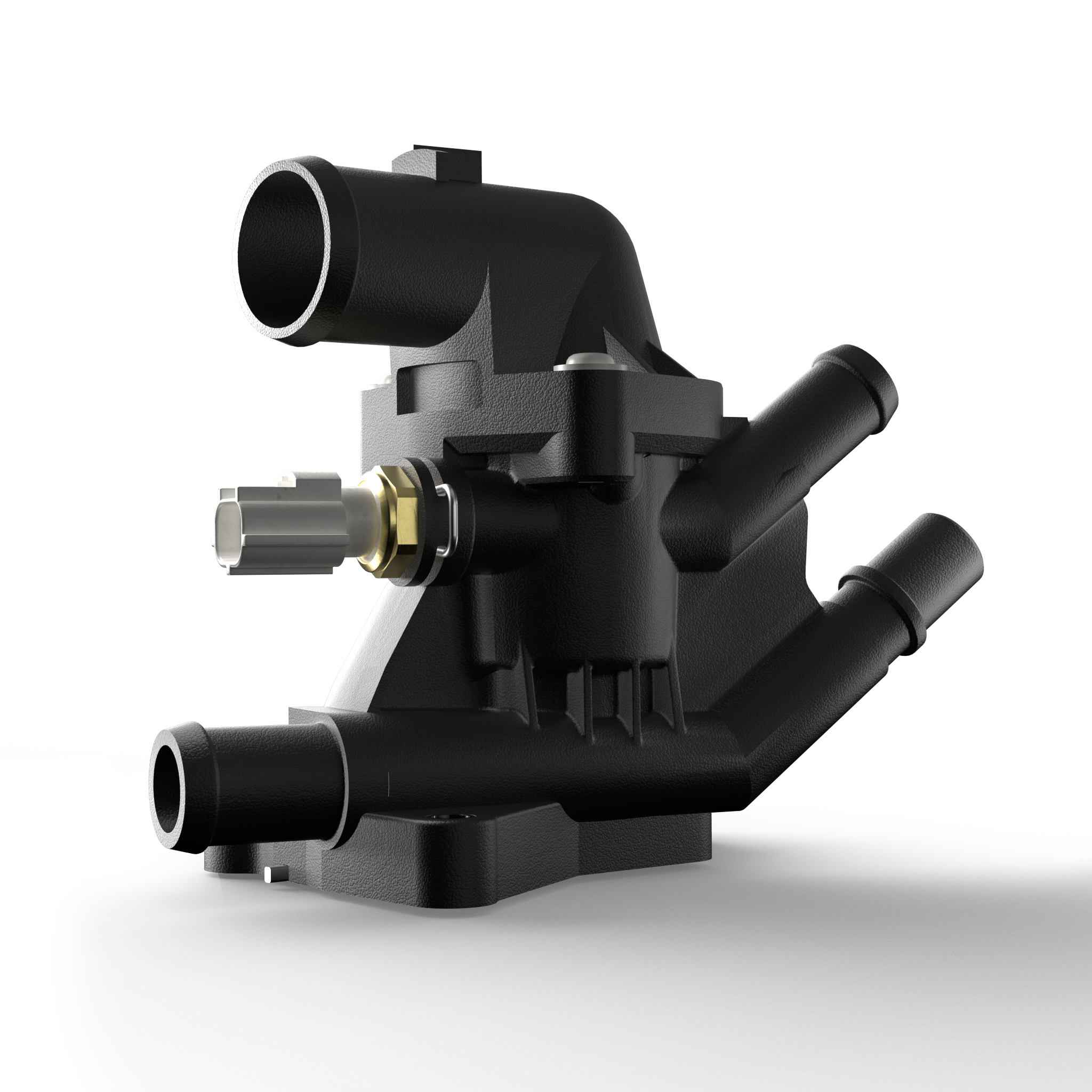
Arlington Thermal Management (UK division), part of the Arlington Automotive group, is a Tier 1 strategic supplier to major automotive OEMs including Ford, Jaguar Land Rover, BMW, Daimler and Renault Nissan.
Whether it’s for automotive or non-automotive applications, the company offers a full system service for cooling flow controls and powertrain thermo-management.
The Negri Bossi team were tasked to work with the Arlington team to create two identical machine and robot cells to manage the continual output from a new suite of extremely complex multi-cavity moulds. The tools would be producing high glass content, nylon thermostat bodies and covers, some body moulds requiring there to be eight independent hydraulic core pull circuits on each of the two 500 tonne machines.
All the moulds in the suite had to be interchangeable between the two cells, quick-change robot heads with binary-coded gripper connections were specified to prevent any error in gripper selection.
Automatically ensuring only good parts reached the post moulding assembly shop was a fundamental requirement for the company, as this would eliminate wasted resources further down the production line. Communication between the IMM and the automation system was therefore key, allowing each cell to fully utilise the sophisticated standard quality monitoring system within the latest CANBIO ST machine’s Tactus control.
Operations Manager, Paul Adams commented:
“Our history with Negri Bossi machines had proven to us we could rely on very precise shot to shot repeatability in the long term. We have machines dating back to 1995 that still surpass our demands for an accurate and stable moulding process. It was imperative that the new lines had this inherent repeatability, but could also warn us of any undesirable trends in the process, for example, material and mould heating/cooling instability.”
“We wanted to continue to work with a company that could supply a complete solution from their own product range, rather than having to piece together a system that wasn’t designed to work in harmony. As Negri Bossi have their own specialised automation company, namely Sytrama, as well as a UK based project manager, they are well suited to this task.”
Improved labour utilisation was another joint target. Operator intervention to the cells for parts distribution to the assembly lines were to be no more frequent than once every 2 hours. This was achieved with a custom-built conveyor system designed to accommodate the company standard, in house parts containers. Active box position monitoring and operator attraction by audible and visual indicators were incorporated in the line.
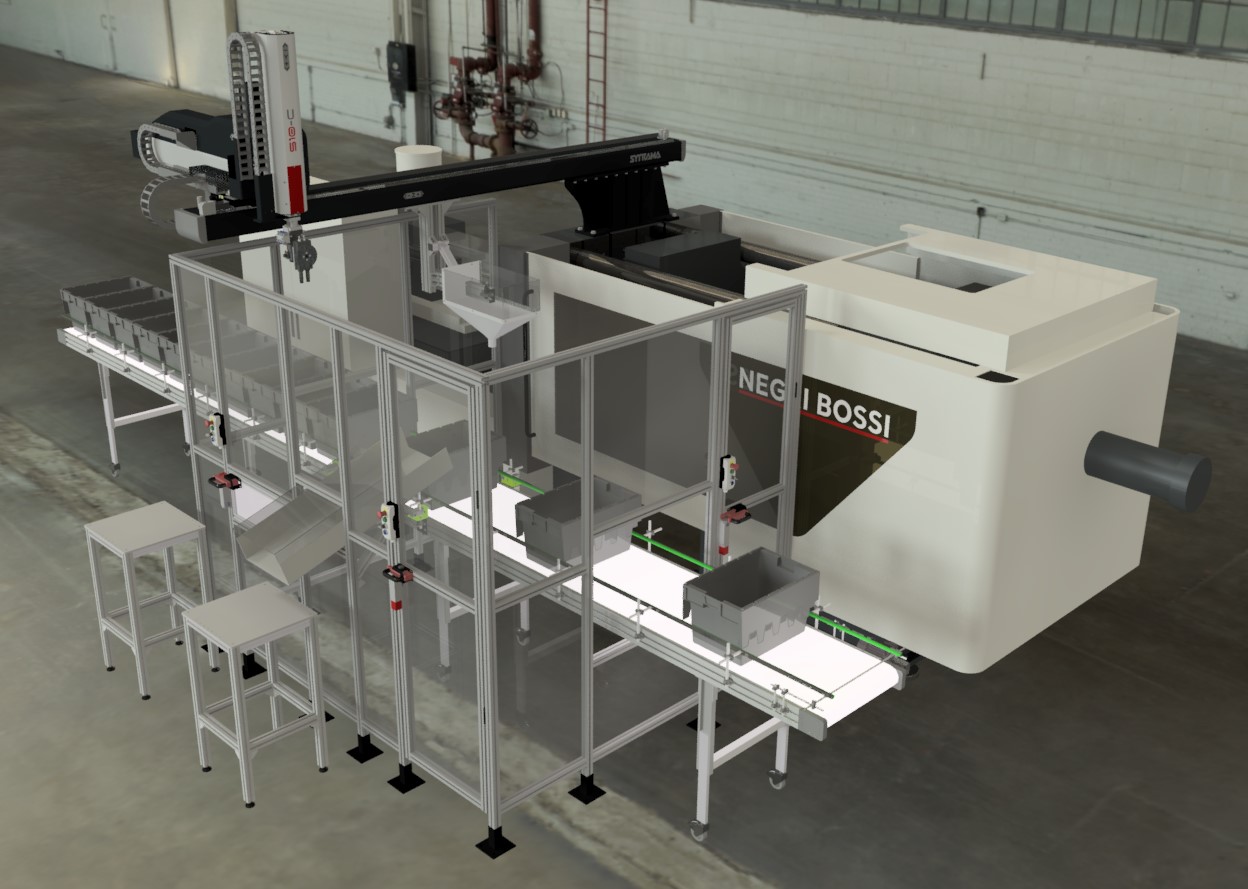
To allow quality control patrol inspectors to take samples from the enclosed system, quality staff can simply press a request button, and the robot will divert components to a quality station. These components are then excluded from the sample count within the normal production control. The same applies to any parts produced outside the CANBIO’s quality monitoring system, the robot depositing ‘suspect’ components on a quarantine table.
The system is also programmed to automatically quarantine a selectable number of cycles at start-up and after any system interruption. This allows process stability to be achieved before components enter the system. As before, the correct box counts are still maintained.
Paul Adams commented:
“The two production cells are now fully operational and have achieved the stringent targets set during our initial consultations with Negri Bossi. The net result is a much higher level of production autonomy, with a significant reduction of non-conforming product entering our ‘downstream’ manufacturing systems.
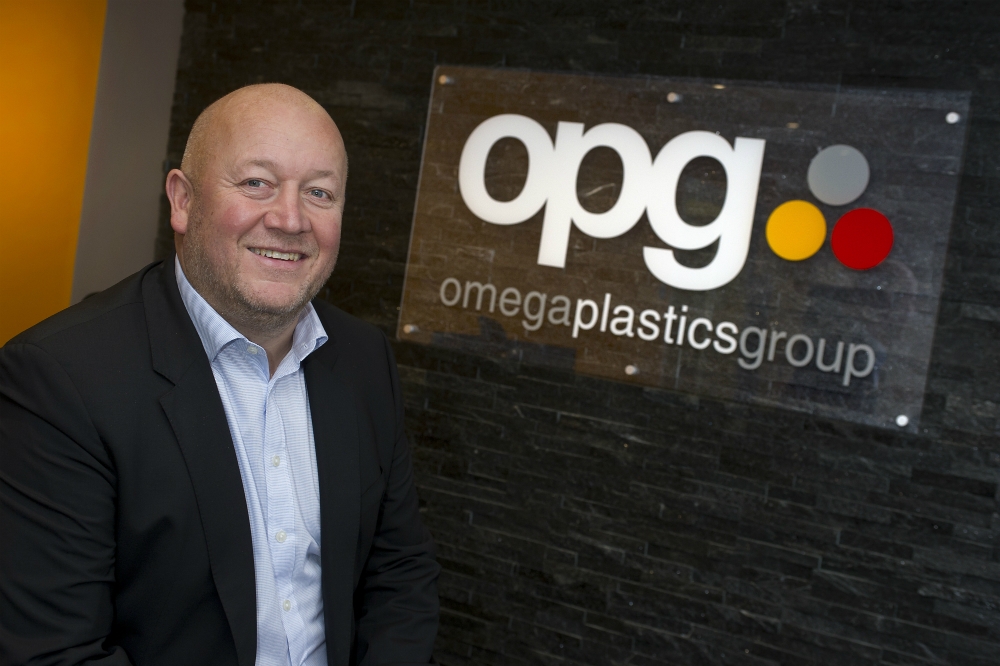
Specialising in custom, multiple-use plastic injection mouldings and rapid tooling for the automotive, healthcare and FMCG industries, Omega Plastics Group has always enjoyed continued growth since its acquisition in 2005 by Chris Thompson and Dave Crone. The purchase in 2015 of high volume, plastic injection moulding specialist, Signal Plastics, further contributed to the growth of the group.
In December 2016, the Group relocated Signal Plastics to a larger 42,700 sq ft factory unit in Bentall Business Park, Washington and invested over £1 million in new injection moulding equipment.
Additional contracts with new and existing customers, including a recent £3 million contract with an OEM specialising in domestic and commercial heating, has led the company to make a strategic decision to merge its two Omega Plastics sites in Blyth and Hartlepool into one, significantly larger 45,000 sq ft facility.
Omega has always invested in the best equipment available for a particular application, whether CNC milling or injection moulding. We asked the company Chairman, Dave Crone, why this is the case?
“We are of course, fully aware that there is a myriad of equipment suppliers to choose from, especially now that import tariffs imposed in the States have shifted the focus of Chinese manufacturers to Europe. Our expansion has required significant expenditure on new toolmaking, injection moulding and ancillary equipment, so we could have easily justified a move to cheaper OEM’s.”
“In some cases, we have had comments from staff members about a particular job being simple to run, so not needing all the ‘bells and whistles’. They do, of course, have a point, but in my experience, the more costly brands are often less expensive in the long run. Even when the time comes to replace the equipment, residual values are many times higher, making a significant contribution to our deposit.”
“Despite having the extra space at our new Team Valley site, we need to make sure we get the most out of every square foot of our production facility. In the case of our mould shop, manufacturers such as Negri Bossi offer superior tie bar spacings and mould height when compared to ‘cost-driven’ machines of similar tonnage. You would often need to buy a ‘size up’ in order to get a similar specification, increasing the machine’s footprint, as well as narrowing the price differential”
“We also see that a continual R&D programme is a priority with European and Japanese brands, as they need to keep a ‘step ahead’ of less expensive competitors. In my experience their equipment has superior levels of control and accuracy, and generally, produce more product for less energy”.
“Continuity of supply is a major concern for our customers, so it follows that our equipment must have minimal downtime. Even the most expensive and well-engineered equipment can suffer a breakdown, so knowing that we are dealing with a genuine UK based subsidiary, rather than an agency is essential. We also know that all spare components for all machine models can’t practically or economically be held in the UK, so a rapid transit time from the OEM’s primary site is also a factor we consider”
“Finally, we have to think about how we present ourselves to our current and potential customers. We openly claim that Omega Plastics Group is one of the countries most advanced and technically competent toolmakers and plastic injection moulding companies. When a customer visits either of our sites, they can see that we have both the people and infrastructure to back this up.”
Originally named Plated Plastic Developments, Birmingham based Quality Plated Plastics, was founded in 1965. Following the installation of a state-of-the-art specialist plastic plating plant in 2008, the company rapidly expanded, allowing it to penetrate the automotive market. Further plant upgrades in 2012 enabled the company to treble the output of satin finishes, meeting the growing demand of major automotive OEM’s.
At the end of 2014, a new ‘mould for plating’ facility was created, allowing some key premium brand automotive companies to shorten their supply chain. Several Negri Bossi injection moulding machines were installed, all customised for the production of PC/ABS. The specification included polymer specific plasticising screw profiles and smaller than typical shot weights when compared to ‘trade moulding’ machines. This provided:
The mould shop quickly grew, by mid-2018 having five machines from 55T to 500T locking force. Sytrama robotic cells were also installed, allowing the company to minimise the handling of components.
The investment included laboratory facilities for the testing of plating chemicals, applied plating thicknesses and thermal cycling and humidity testing to PV1200. The net result was the creation of class-leading product quality.
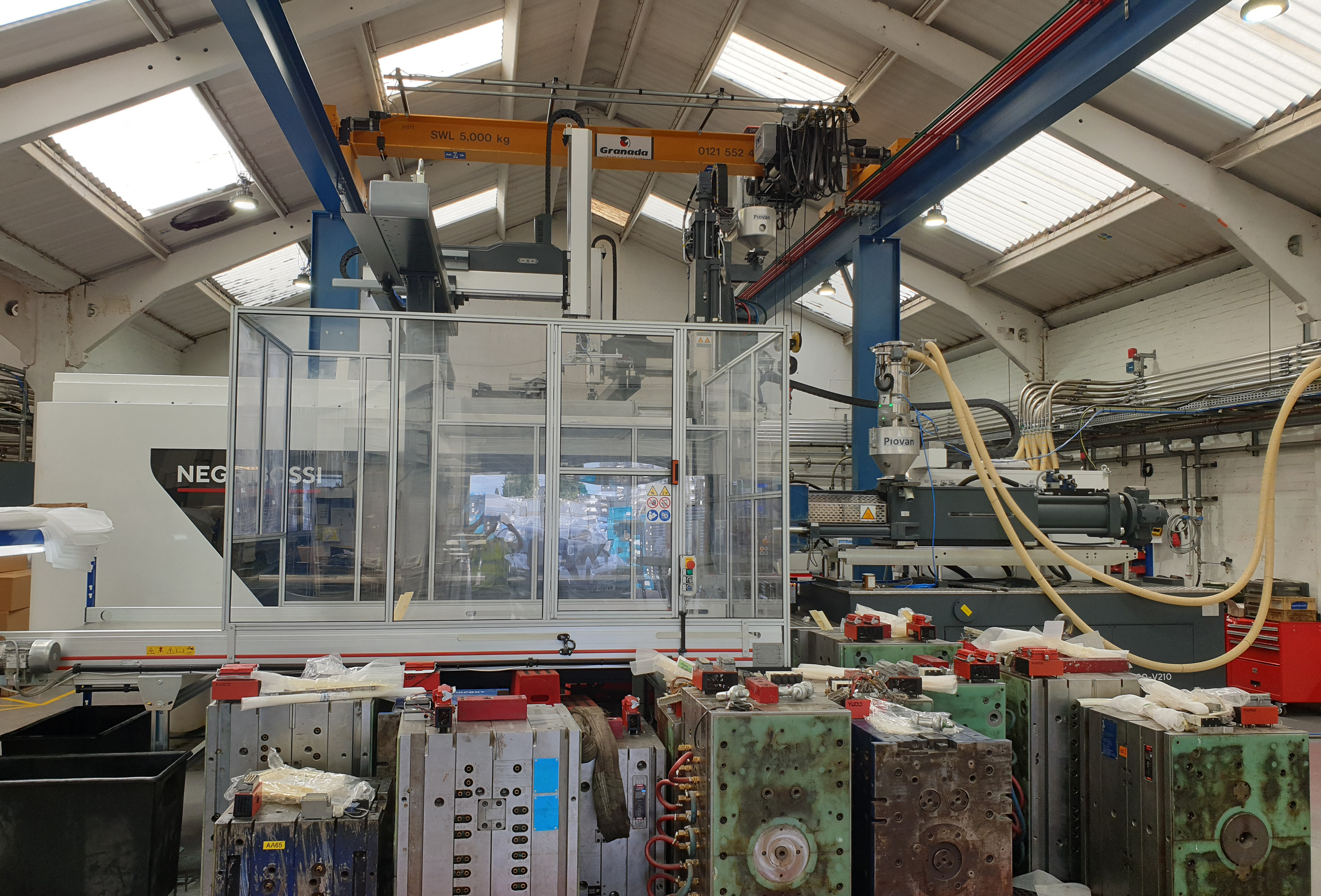
In January of this year, an additional 130T Negri Bossi CANBIO machine and 500T MULTIMAT machine were delivered. This followed the construction of a new 14,000 square foot warehouse that subsequently allowed the mould shop to be expanded into a newly vacated area. A new chilled water system and a dedicated in-house tool maintenance department was implemented in the major upgrade.
The new MULTIMAT machine, as well as adding additional large tonnage capacity, is specified to handle a variety of future twin-shot projects. The machine has an additional vertical injection unit that will allow the production of components with two distinct material types, removing the need for assembly. By combining plating grade ABS with non-plating polymers such as nylon and TPE, part finished components can be produced without the need for product masking.
The machine has an integrated servo-powered rotary table with multiple water circuits. It is also specified with oil circuits for core pulling functions and part ejection. In addition, a frame-mounted Sytrama robot can service ‘tool transfer’ type moulding and de-mould finished components.
When asked about the recent mould shop expansion, QPP Managing Director John Timmins commented,
“As around seventy percent of our ‘Mould for Plating’ work is automotive, we need to cater for the steadily increasing trim specification of premium brand models. As well as offering faultless gloss and satin chrome finishes, we have now prepared for an increased demand for partly finished dual material components. OEM recycling targets mean that these components are best manufactured within a single moulding operation and plating process, i.e. without the need for an assembly stage”